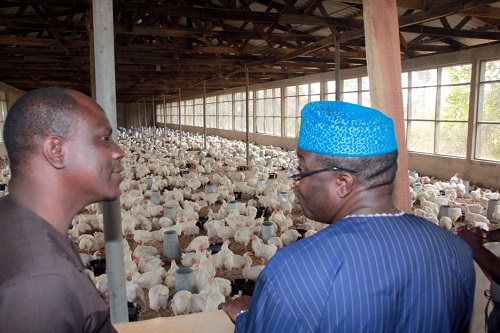GN photo
By
Durodola Tosin and Ladi Adejumo
Poverty has traditionally been a dominant issue in Nigeria. Considering the high and rising unemployment rates in Ekiti State, poverty reduction strategies should be a priority. This is because a high level of poverty inevitably affects the involvement of the public in any democracy: in a society where able-bodied adults live below the poverty line and young graduates remain unemployed, they will invariably develop a jaundiced perspective of democracy and its processes. In summary, economic frustration typically breeds citizens’ apathy with the democratic process.
Although poverty manifests in a diverse manner, material poverty is widespread and visible while posing the greatest threat to democracy. As poverty leads to the erosion of public interest in democracy, it inevitably enables moneybags to hijack the process and even maintain a stranglehold on it.
In a way, poverty must be seen as one of the greatest threats to democracy as it weakens the peoples’ will while depriving them of freedom and independence of thought. Ultimately, the citizenry loses faith in the capacity of democratic institutions to improve their welfare. As poverty rises, people typically lose faith in the capacity of democratic institutions to improve their welfare.
Furthermore, poverty threatens democracy in at least two ways. First, the elite whose interest may not be democratic can easily manipulate the poor masses by channelling their energies into anti-democratic activities like riots and demonstrations, leading to civil strife. The most dangerous effect of poverty is the exposure of the poor to tyrants and demagogues who could easily rally them to weaken existing democratic institutions. Secondly, the illicit practice of purchasing votes thrives in poverty-stricken environments where obstructions to the seamless conduct of democratic business exist.
Poverty reduction in Ekiti was at the core of Dr. Kayode Fayemi’s first term mandate. He expressed this in the record employment programs and poverty reduction policy projects which were executed under his leadership. He immediately assembled a competent team and aggressively pursued the achievement of this objective by spearheading an agrarian revolution unprecedented in the history of the state. He pledged and achieved the following: revival of cocoa plantations leading to Ekiti State’s emergence as a leader in cocoa production; repositioning the agricultural sector to contribute up to 50% of Internal Generated Revenue (IGR); training and employment of Ekiti youths in mechanised agriculture by 2014. Dr. Fayemi understood that many unemployed young adults and adults expectedly depend on democracy to grow the economy to generate employment for them.
Of course, employment assures a better material existence which translates to strong and pro-active involvement of citizens in democracy. With employment, people can earn a living and pay taxes to enable government execute its development initiatives. It is also possible to do away with some vices prevalent among the unemployed when full employment is guaranteed. An idle hand is indeed the devil’s tool. High levels of unemployment and accompanying poverty is disastrous as it is presently in Ekiti.
Unemployment poses a great risk to democracy as the affected citizens shun the process while many participate in democratically subversive activities. Unsurprisingly, thugs, bandits and other undemocratic forces are typically recruited from the ranks of the unemployed.An unemployed person cannot pay tax or even meet family needs let alone patronise goods and services that are being produced in the society.
Also, as the population increases, the level of demand for services rises. It was on this basis that Fayemi’s government established the Youth in Commercial agriculture Development (YCAD) which employed 430 youths as follows; Y-CAD Arabic (cassava 150, rice 159), livestock (39), Nursery (25), Aquaculture (40), Afforestation (12), Oil Palm (5). This program added 15,000 indirect jobs to the economy of Ekiti State. Youths under this program achieved both the largest productivity (yield/Ha) and cultivation in Nigeria. Under Fayemi’s watch, Ekiti State’s yield was at 15T/Ha, which is higher than the national average of 12T/Ha. Another 150 YCAD youth cultivated between 5Ha-15Ha each of cassava. A total of 1,025Ha was cultivated in 2012 additional 700Ha was cultivated in 2013.
This YCAD program facilitated the cultivation of a total of 100Ha and 165Ha of watermelon in 2012 and 2013 respectively. While 460Haof maize was cultivated in 2013, 1000Ha of land was opened up in 2013 for arable crop cultivation. 200 youth farmers were trained in modern rice farming while 600 youth including traditional farmers were assisted to cultivate 3,000Ha of rice. This program accelerated the establishment of Fish farms were in the following areas as follows; Ado Ekiti (6), EfonAlaaye (8), Igede and IjesaIsu. A total of 106,000 juveniles were raised to smoking/table size fishes. 18 tree nurseries were raised 20,000 cocoa and 10,000 oil palm and seedlings. The unit raised 360,000 cocoa seedlings and distributed to farmers at N15 per seedling while209,560 oil palm seedlings were raised and ready for plantation in May 2014.
Indeed, Ekiti state was on the path of rapid agrarian revolution. Dr. Fayemi’s government ensured that the Garri processing factory established at EporoEkiti was managed by a YCAD participant which employed 25 people. Palm oil processing plant was also set-up and manned by 7 YCAD participants in Ire Ekiti. 37Ha of grasses and 5Ha of legumes was planted, tendered, sprayed, weeded and fully established. 150,000 Cocoa seedlings and 60,000 of oil palm seedlings were distributed to farmers at highly subsidized rates. 209,560 oil palm seedlings were distributed in 2012, 2013 and 2014. Farm settlement cultivable land before Fayemi’s administration increased from 1,849 hectares in 2010 to 4,349 hectares by the end of 2014 adding 2,500, a 235.2 % percentage increase.
Under his watch, the government embarked on the upgrading of Forest Governance in partnership with the European Union and Food and Agricultural Organisation (FAO). Over 1100Ha of cassava was cultivated in 2012 and ready for harvest in 2014. Institutional Buyers, such as Thai Farms, Nigeria Starch Mills, and DADTCO were on queue for all year round off-taker supply. Over 1,000ha was cultivated under the YCAD-Rice Expansion Programme in 2012 and 850ha in 2014. His government implemented the YCAD Nursery Operations – YCAD Participants which nursed over 300,000 already distributed to farmers across Ekiti.
As a visionary leader, there was successful drive for private sector in agriculture with over USD $300m commitments from both international and indigenous agri-business including:
- AGCO establishment of 2,000Ha mechanised farm centre in collaboration with EKSG (USD $7m)
- Dutch Agriculture Development & Trading Co (DADTCO) establishments of high quality cassava flour processing factory with the introduction on amorphous mobile processing factory unit across Ekiti with the state holding 15% equity.
However, the re-entrance of Ayo Fayose into Ekiti politics in 2014 marked an end to all the agrarian programs initiated by Dr. Fayemi. Over 20,000 youths that benefited directly and indirectly from the YCAD scheme were sacked in November 2014. The College of Technical and Commercial Agriculture in Isan Ekiti has not been funded since September 2014, while the equipment and tools within the college rots away. It is unsurprising that over 100 tractors distributed by Dr. Fayemi’s government for mechanized agriculture have been looted under the watch of Mr. Fayose. The agrarian sector which contributed over 50% of the state IGR of during Dr. Fayemi’s tenure has ceased to perform at that level.
Apparently undeterred by the parlous state of its economy,Ekiti state Governor, Mr. Fayose borrowed a total sum of N87 billion (domestic loan) between 2014 and 2017 while borrowing $31.6 million (external loan) with no socio-economic impact. In Debt Management Office’s latest bulletin, it disclosed that Fayose’s administration still had a fresh application of N25 billion in 2017 awaiting consideration.
This culture of crass opportunism, charlatanism and brigandage must stop. As the Election Day draws closer, the electorate has the deciding vote to restore the hopes and prospects of agrarian revival in Ekiti State. This must however, be a collective mission, one that moves beyond individual agendas. It must be devoid of self aggrandizement and crass opportunism. This is a task that must be tackled collectively. Is it not ironic that the campaign of the incumbent Governor, Mr. Ayo Fayose has centered on continuity? Continuity of what? Reduction in agricultural productivity? Rise in poverty and despair? Oppression and dehumanizing circumstances? Economic and social insecurity? NEVER!
This is the time the electorate must think about the future of the state and the greatness that beckons under the right leadership. The growth of Ekiti state is dependent on the holistic approach that you take not only the Election Day but also beyond. Dr. Kayode Fayemi is committed to this development ideal, and so should you. His mission in public life has always centred on transforming the material conditions of the people. This also revolves around three imperatives; breaking the yoke of ignorance keeping Ekiti people down; liberating them from ill-health and other limitations that restrains them from achieving their potentials. While the third one is breaking the stranglehold of poverty which keeps people from living full creative lives.”In practical and policy terms, this for him has always meant prioritising social investments in education, agriculture, healthcare and other social interventions that reduce the cost of living, while raising the quality of life.
We need to understand that the basic foundation for democratic consolidation is the strength of the economy. Production is the generator of wealth through the production of goods and services for people’s consumption. An economy that is buoyant can generate a high level of production while a less buoyant economy can hardly sustain a high level of production. By production, I mean agriculture! Improved agrarian system is a way to meet the material needs of the citizens. Failure of Fayose’s administration to rise to the occasion and be counted has put the future of agriculture and Ekiti state’s economy in jeopardy. The number of economically displaced persons keeps rising, while the democratic order is breathing laboriously due to the economic burden. Indeed there is much that has to be repaired and redressed in Ekiti before it can go forward.
A mechanised agrarian sector will not only change the status of Ekiti State in Nigeria but will also offer a tremendous opportunity for our teeming youths to be creatively and productively engaged. The first task however depends on the decision of the electorates this month. Your PVC is the greatest tool to elect a leader of unimpeachable records, to help revive the agrarian sector in Ekiti state and reposition it for wealth creation and productivity.
Our farmers deserve better.
Durodola Tosin
Tosin Durodola is the Editor-in-Chief of Core Magazine Africa and LJCMA.
He is the Convener of Kayode Fayemi Youth Support Movement (KAFYSM). He is a former Broadcast Journalist at the Nigeria Television Authority (NTA) and Bloomshire Media Nigeria. He has written and published over 20 research papers on history, politics, foreign policy and international relations in National and International periodicals. He is currently writing a book on “Nigeria and the UN Security Council: A Critical Analysis of the Challenges in her Quest for Permanent seat”.
He holds a Bachelors degree in History and International Studies from Bowen University. He is a Masters candidate of Diaspora and Transnational Studies at the University of Ibadan.
Contact: [email protected] or [email protected]
Ladi Adejumo
Ladi Adejumo is a Media strategist and PR expert.




No Comments Yet!
You can be first to comment this post!